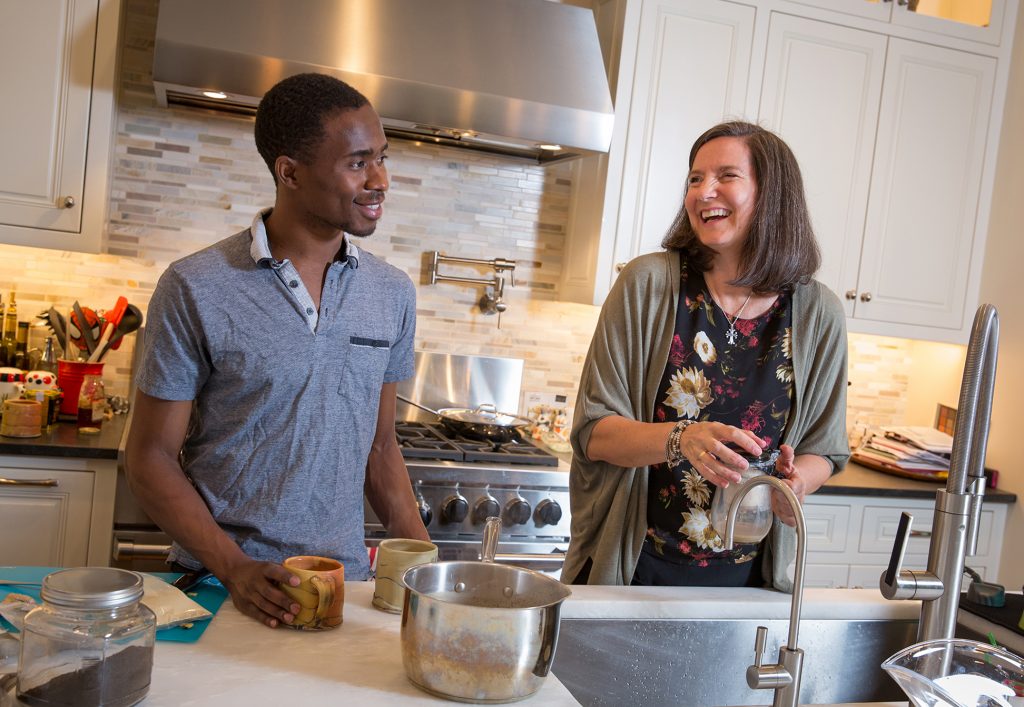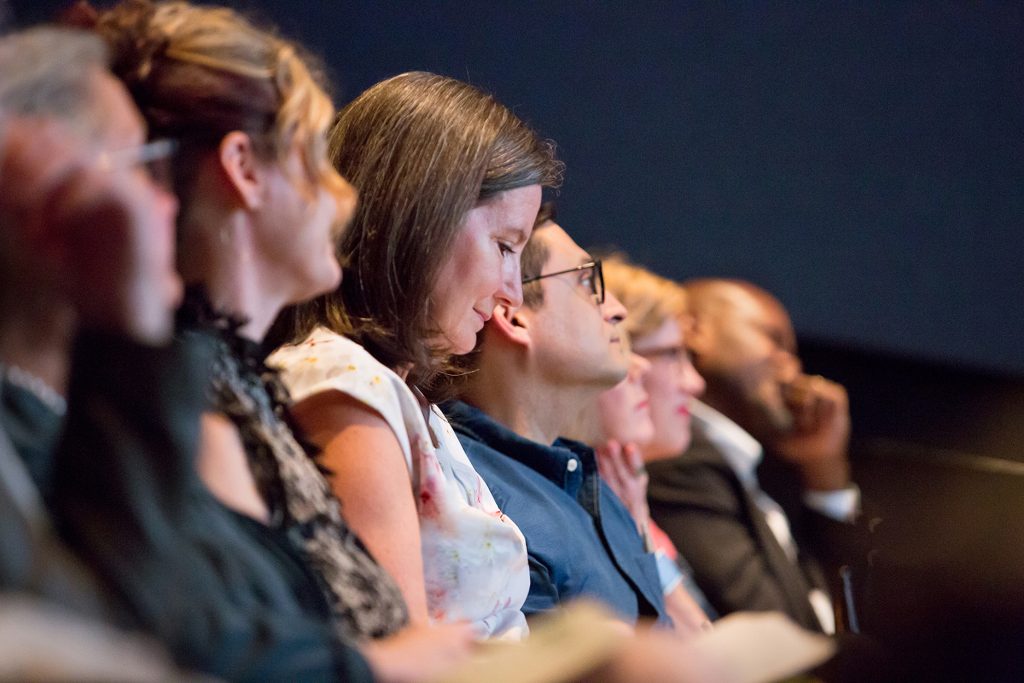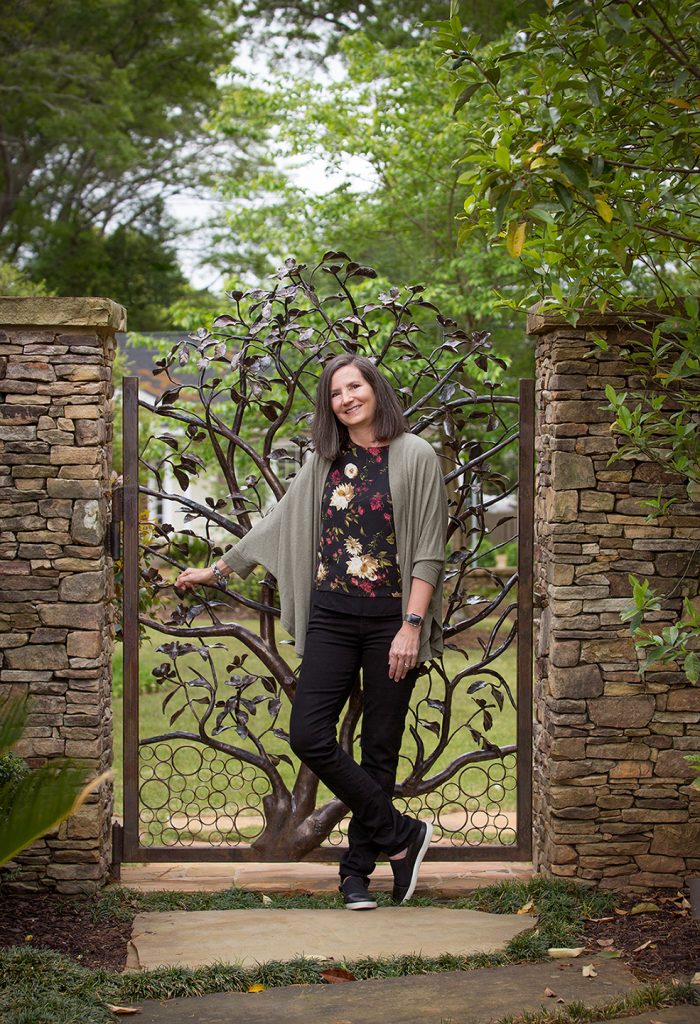The Kindness of Strangers: Kay Parker and a Simple Glass of Water Open Possibilities
Some of the reasons for Kay Parker’s dedication to advocacy are quite simple and an expression of her faith; others result from her own experiences. Living abroad taught Parker the difficulties of living outside one’s native culture. Grace Athens, an unaffiliated church that meets in the UGA Chapel, has further connected Parker to UGA graduate students in a personal, enriching way.
By Cynthia Adams | Photos by Nancy Evelyn
Kay Parker is an industrial engineer by training; so, it follows that she is a pragmatist who seeks elegantly simple solutions to complex problems. However, for some years, solutions to a very human problem are most capturing her attention. At her own front door, Parker met a poignantly human issue, one she since has addressed one student at a time: Loneliness.
Notably, the realization was triggered by a pair of strangers on a hot afternoon, ones she might have easily ignored.
Soon after moving to Athens in 2013, Parker noticed how passersby would often stop to admire their gate, which is configured as a dogwood tree.
“The first fall we were in the house, a couple of people had stopped to take photos of our gate,” she recalls. “Happens that it was a grad student from Granada and his father who stopped outside. I went out and asked if they would like to come in and have a drink of water. Then, we have this iron railing sculpture made by the same artist that had made our gate. So, I showed them that, too, and they stayed for about an hour. It was revealing.”
The hour-long interaction revealed this: a palpable level of social isolation that made an impression upon Parker. “The father had been in the country with his son, a student, for two weeks helping him settle in for graduate studies,” Parker explains.
The father and son had walked much of the campus and town, becoming familiarized with a place that was radically different than Granada. While his son was in class, the father walked and walked. Yet no one had spoken to him for the entire time during those forays, Parker says, “and certainly hadn’t invited either of them into their home to sit down for a friendly visit.”
Why had those 14 days been so unwelcoming? “In America, I feel we live behind walls,” she answers.
The encounter bothered her. Something so simple as a glass of water and a friendly interchange had the power to change those difficult days and make the father more at ease about leaving his son in a foreign place.
“I thought about all the international students here, and who go through their years here, and are not invited into a home. I don’t want them to go back home, never having been in a home here.”
Her awareness has since led to student events hosted in her Athens home, which is within easy walking distance of the campus.
“I wish I could get every graduate student in my house. I wish I could meet every one…I am just throwing a pebble into a big lake.”
UGA has over 7,000 enrolled graduate students. Of that number, more than 1,400 are international students. Parker finds that the international ones are often isolated, lonely, financially strapped, and lacking a support system, with emotional needs that she says aren’t easily addressed. One answer, the simplest and best, is by practicing inclusion. (Married students, and those with children, are also dealing with special stresses.)
Parker finds that the international students are often isolated, financially strapped, and lacking a support system, with emotional needs that she says aren’t easily addressed. One answer, the simplest and best, is by practicing inclusion.
For Parker, this means opening her home and making former strangers welcomed friends. “Not many people support graduate education and that’s a shame.”
The luckiest of the students she encounters—and a growing number of them—get invited into the Parkers’ two-story Five Points home with an inviting porch. “We work with international students as a group. One thing leads to another,” Parker says.
That one thing involves making sure that graduate students feel welcome and assimilated.
“Kay Parker has been a tremendous supporter of graduate students,” says Suzanne Barbour, dean of the Graduate School. “She understands that their needs extend beyond the financial and that behind every successful graduate student there is a supportive community. Thanks to Kay and her family for enveloping UGA graduate students in a community that provides the support they need to excel in their studies and aspire to their chosen careers.”
One of the most fascinating aspects of all is just how personal and passionate this mission has become for Parker and her family. For one thing, Kay Parker isn’t a dawg, per se. Not technically. She attended GA Tech, a rival institution, but married John Parker, a fiercely loyal dawg and Coca Cola executive, becoming a dawg by association. Her husband, who graduated from UGA in 1973, studied history before attending law school in NC after she accepted a job in the Research Triangle with IBM.
Her father-in-law, J. Reid Parker, was a well-known UGA faculty member in forestry. Through her husband and his family, there were long standing UGA allegiances. The couple eventually returned to Georgia after years living in various cities abroad, including London and Oslo.
(And as the saying goes, there is no passion to equal that of a convert’s.)
Parker has since become a vigorous volunteer for social causes and graduate education at Georgia owing to many reasons. Her advocacy springs in part due to past experiences as an educator in Atlanta before moving to Athens, and also as part of her volunteer and church activities at Athens Grace.
“After moving here, I had graduate students in my life immediately,” she explains. “The woman who built my house picked me up the first day we were here. She took me to a church and said, ‘This is where you are going to go because they need you.’” The congregation was “all students—and a few older people like me.”
Parker got to know her fellow church members and their concerns. Outreach became a focus for her, particularly efforts concerning international students. Having experienced culture shock in her own life, she used empathy and direct understanding.
“I’ve always had a heart for international people. We lived overseas; it’s not easy to adjust to the culture.”
The Parkers’ home has since become an embassy of sorts.
“We had a going away party for one of the Chinese students. They couldn’t believe they were in such a nice house for a party. That started us hosting dinners. We (continue to) have dinners for graduate students, just to get to know them.”
She considers how others can be of help. As Parker explains, it can be as simple as being observant.
Through this, Parker has become close to an international student who is obtaining his PhD this year in nuclear biomedicine. “He came from Uganda. I asked how he had spent last Christmas, and he told me in a cold room without a coat, sipping tea. He came to us for Christmas this year and he cried, saying it was like being home in Uganda.”

Parker with student Kenneth Ndyabawe. Ndyabawe teaches his hostess how to make spiced chai tea the way he does in Uganda, his home country. Ndyabaw is a doctoral student in engineering, whose research in microdevices and software concerns human brain functionality and neurological diseases.
Parker responded to stories such as these by doubling down on her efforts to meet and engage graduate students. Hosted events have become almost weekly. She laughs that when the house is invaded by students, her husband, and teenager, Lucas, go into hiding. Her son Reid simply becomes absorbed by his iPad.
More events keep shaping up, all in the comforts of a home.
Students instigated a hummus and pita cookoff. Then last year, the Parkers hosted a traditional Thanksgiving for the first time, complete “with a big old ham and turkey. They ate every bite of the meat!”
The Parker family home is a two-minute walk to the baseball stadium and close to married housing. Married students also deal with great isolation. “How many have children and feel all alone? They bring their spouses and their children to the dinners and are a part of that.”
Any endeavor that connects students with the citizenry is helpful. She mentions that the Graduate School is making inroads to connect graduate students with the larger Athens community via the GS LEAD Program, a Graduate School initiative which is led by Julie Coffield, former associate dean of the Graduate School. GS LEAD pairs students who are learning leadership and professional skills with community projects.
“GS LEAD continues to be an outstanding and innovative model for graduate education in the STEM disciplines,” says Dean Barbour of the Graduate School. “Not only does the program provide STEM graduate students with training in the ‘plus’ skills necessary to be successful for careers outside of academics, it also provides them with the opportunity to give back to their communities. In that way, GS LEAD trainees are wonderful ambassadors for graduate education, as they demonstrate the impact that technically skilled, caring, and generous leaders can have on the community.”
GS LEAD, Parker says approvingly, “takes them into the community. It gets them some exposure.” Eyes and hearts may be opened, just as her own were.
“I think,” she answers, “if there was some kind of mentorship program? I call it ‘Life on Life.’ Whenever you can put two lives together, both people are enriched. There are enough businesspeople, professors, adults in this city; maybe if they could start something. People are a bit afraid—they may be afraid of having someone so different in their home.”
“But once you open your home to one of them you realize they are hard working students that happen to be far from home,” she says. “If we were in their country we would be invited in.”
Through her ongoing work with Grace Athens, which meets on campus at the North Chapel, Parker grows her student involvement. She says the parishioners consist of “a bunch of students and four old people. We don’t have a building.”
Student involvement is part of the family’s history. Parker’s in-laws sponsored a student from France for three years via Rotary. When her in-laws retired, they visited with the former student and her French family. “We do this in our church, and it is amazing, the relationships that you can build.”
She is also involved with 30 other volunteers in a program called Operation Christmas Child, which sends holiday boxes to children in 100 countries. Volunteers fill shoeboxes with school supplies, toiletries and small toys.
“People collect the shoeboxes, and other team members are trying to get more groups involved in packing…It started 25 years ago in Kosovo.” Parker is also on the board of a program that has a radio program for women worldwide.
How to inspire others to reach out to the strangers in their midst, especially students?
“It’s because I had graduate students in my life,” Parker offers. “When you’re in a small group, and hear their struggles, you learn. So many of them don’t know how they’re going to pay for the next year. I can’t pay for them all, but I can be a listening ear. People just need to be exposed to them to fall in love with them.”
Kay Parker says in the end all changes begin in small and often personal ways.
“It’s all relational,” as she explains. “Someone can do mentoring. They can have coffees once a month, like the women’s basketball coach,” Parker says.
In April, Parker was a judge for 3MT, the annual Three Minute Thesis competition sponsored by the Graduate School.

Parker was a judge for 3MT, the annual Three Minute Thesis competition sponsored by the Graduate School. “Wow, what amazing Graduate students we have at UGA,” she observes after the event. “They were all so well spoken and are solving such critical issues with their research.
“Wow, what amazing graduate students we have at UGA,” she observes after the event. “They were all so well spoken and are solving such critical issues with their research. From how to fight the flu, to the perfect vaccine for Dengue Fever, to Energy in business, to the shape of tomatoes. Who would not be impressed with these young people? They are bright and super passionate about their research. I could not help but think how many people would be inspired by the students if the Three Minute Thesis Competition was broadcast on PBS. I could see many high school students motivated and undergraduates encouraged to investigate graduate school. PBS broadcasts GA Tech’s Senior Design Project Competition, why not showcase our outstanding students?”
And Parker pauses. “Notice UGA is mine now?”
“I call it ‘Life on Life.’ Whenever you can put two lives together, both people are enriched,” says Parker.”









